| Srl | Item |
| 1 |
ID:
123261
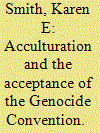

|
|
|
|
|
| Publication |
2013.
|
| Summary/Abstract |
This article contributes to the burgeoning literature on why states ratify human rights treaties. It first analyses why Ireland, the United Kingdom and the United States did not initially ratify or accede to the 1948 Genocide Convention, and then explores why the three countries eventually did accept it, 20-40 years after it was approved by the United Nations General Assembly. The extent to which material costs and benefits, the logic of appropriateness, and acculturation played a role in each of the three cases is assessed. Acculturation is particularly evident in the Irish case, but it also helps to explain the UK and US acceptance of the Convention.
|
|
|
|
|
|
|
|
|
|
|
|
|
|
|
|
| 2 |
ID:
120785
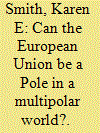

|
|
|
|
|
| Publication |
2013.
|
| Summary/Abstract |
Can the EU serve as a pole in a multipolar, interdependent international system? The EU will face three particular challenges operating in such a system: the challenge of re-establishing credibility after the euro crisis; the ever-present challenge of achieving unity among the member states; and the challenge of adapting foreign policy behaviour to match the new international environment. There is a risk that the EU could slide into irrelevance.
|
|
|
|
|
|
|
|
|
|
|
|
|
|
|
|
| 3 |
ID:
180826
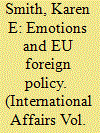

|
|
|
|
|
| Summary/Abstract |
This article assesses the role that emotions play in European Union foreign policy-making. EU decision-making has often been depicted as technocratic and ‘de-dramatized’, yet there are still situations in which emotions can affect the process and outcomes of foreign policy decision-making. Using examples of the EU's responses to crises in Ukraine and Myanmar, the article illustrates that emotions can motivate the taking of particular decisions at particular times. Further, the EU expresses emotions in its foreign policy communications, although its use of emotional diplomacy may not be accompanied by substantive action appropriate to the emotions expressed, thus revealing the existence of an emotions–action gap. The ‘emotional turn’ in foreign policy analysis can open up new directions for research in EU foreign policy, and the conclusion considers other promising avenues for researching emotions and EU foreign policy.
|
|
|
|
|
|
|
|
|
|
|
|
|
|
|
|
| 4 |
ID:
140436
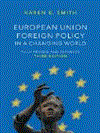

|
|
|
|
|
| Edition |
3rd ed.
|
| Publication |
Cambridge, Polity Press, 2014.
|
| Description |
xiii, 292p.: tables, boxes, abbre.pbk
|
| Standard Number |
9780745664705
|
|
|
|
|
|
|
|
|
|
|
|
Copies: C:1/I:0,R:0,Q:0
Circulation
| Accession# | Call# | Current Location | Status | Policy | Location |
| 058284 | 327.14/SMI 058284 | Main | On Shelf | General | |
|
|
|
|
| 5 |
ID:
151554
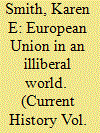

|
|
|
|
|
| Summary/Abstract |
[A] more mercurial United States, less consistent in its support for European integration, could force the EU to rely more on itself.”
|
|
|
|
|
|
|
|
|
|
|
|
|
|
|
|
| 6 |
ID:
129208
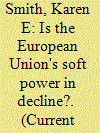

|
|
|
|
|
| Publication |
2014.
|
| Summary/Abstract |
Almost twenty-five years ago, the political scientist Joseph S. Nye Jr. coined the term "soft power" to capture the influence that the United States exercises not through coercion or inducement but through attraction. Coercion and inducement-the stick and the carrot-are forms of command power (or what Nye calls "hard power"), delivered via economic, diplomatic, or military instruments. Command power is used to compel or bribe others to do what you want them to do. Soft power, in contrast, is less a policy instrument to be wielded than an indirect force; it emanates from the attractiveness of a state's culture, political values, and foreign policies. Soft power encourages other international actors to cooperate with a state (or a multistate organization like the European Union) to pursue what they perceive as shared goals and values. It is therefore a less costly means of attaining desired outcomes than the use of command power.
|
|
|
|
|
|
|
|
|
|
|
|
|
|
|
|
| 7 |
ID:
171784
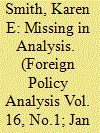

|
|
|
|
|
| Summary/Abstract |
Foreign policy analysis (FPA) opens the “black box” of the state and provides explanations of how and why foreign policy decisions are made, which puts individuals and groups (from committees to ministries) at the center of analysis. Yet the sex of the decision-maker and the gendered nature of the decision-making process have generally been left out of the picture. FPA has not addressed questions regarding the influence of women in foreign policy decision-making processes or the effects of gender norms on decision-making; indeed, FPA appears to be almost entirely gender-free. This article argues that “gendering” FPA is long overdue and that incorporating gender into FPA frameworks can provide a richer and more nuanced picture of foreign policy–making.
|
|
|
|
|
|
|
|
|
|
|
|
|
|
|
|
| 8 |
ID:
066036
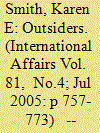

|
|
|